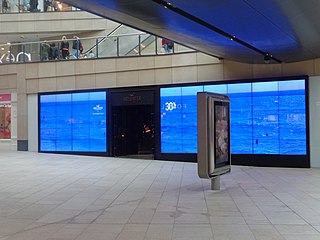
Electronic funds transfer at point of sale is an electronic payment system involving electronic funds transfers based on the use of payment cards, such as debit cards or credit cards, at payment terminals located at points of sale. EFTPOS technology was developed during the 1980s.

Sales are activities related to selling or the number of goods sold in a given targeted time period. The delivery of a service for a cost is also considered a sale. A period during which goods are sold for a reduced price may also be referred to as a "sale".

Telemarketing is a method of direct marketing in which a salesperson solicits prospective customers to buy products, subscriptions or services, either over the phone or through a subsequent face to face or web conferencing appointment scheduled during the call. Telemarketing can also include recorded sales pitches programmed to be played over the phone via automatic dialing.

Mobile payment, also referred to as mobile money, mobile money transfer and mobile wallet, is any of various payment processing services operated under financial regulations and performed from or via a mobile device. Instead of paying with cash, cheque, or credit card, a consumer can use a payment app on a mobile device to pay for a wide range of services and digital or hard goods. Although the concept of using non-coin-based currency systems has a long history, it is only in the 21st century that the technology to support such systems has become widely available.
Telephone slamming is an illegal telecommunications practice, in which a subscriber's telephone service is changed without their consent. Slamming became a more visible issue after the deregulation of the telecommunications industry in the mid-1980s, especially after several price wars between the major telecommunications companies. The term slamming was coined by Mick Ahearn, who was a consumer marketing manager at AT&T in September 1987. The inspiration for the term came from the ease at which a competitor could switch a customer's service away from AT&T by falsely notifying a telephone company that an AT&T customer had elected to switch to their service. This process gave AT&T's competitors a "slam dunk" method for the unauthorized switching of a customer's long-distance service. The term slamming became an industry standard term for this practice.

Direct marketing is a form of communicating an offer, where organizations communicate directly to a pre-selected customer and supply a method for a direct response. Among practitioners, it is also known as direct response marketing. In contrast to direct marketing, advertising is more of a mass-message nature.

Online shopping is a form of electronic commerce which allows consumers to directly buy goods or services from a seller over the Internet using a web browser or a mobile app. Consumers find a product of interest by visiting the website of the retailer directly or by searching among alternative vendors using a shopping search engine, which displays the same product's availability and pricing at different e-retailers. As of 2020, customers can shop online using a range of different computers and devices, including desktop computers, laptops, tablet computers and smartphones.
A merchant account is a type of bank account that allows businesses to accept payments in multiple ways, typically debit or credit cards. A merchant account is established under an agreement between an acceptor and a merchant acquiring bank for the settlement of payment card transactions. In some cases a payment processor, independent sales organization (ISO), or member service provider (MSP) is also a party to the merchant agreement. Whether a merchant enters into a merchant agreement directly with an acquiring bank or through an aggregator, the agreement contractually binds the merchant to obey the operating regulations established by the card associations. A high-risk merchant account is a business account or merchant account that allows the business to accept online payments though they are considered to be of high-risk nature by the banks and credit card processors. The industries that possess this account are adult industry, travel, Forex trading business, multilevel marketing business. "High-Risk" is the term that is used by the acquiring banks to signify industries or merchants that are involved with the higher financial risk.
3-D Secure is a protocol designed to be an additional security layer for online credit and debit card transactions. The name refers to the "three domains" which interact using the protocol: the merchant/acquirer domain, the issuer domain, and the interoperability domain.
Merchant services is a broad category of financial services intended for use by businesses. In its most specific use, it usually refers to merchant processing services that enables a business to accept a transaction payment through a secure (encrypted) channel using the customer's credit card or debit card or NFC/RFID enabled device. More generally, the term may include:
A robocall is a phone call that uses a computerized autodialer to deliver a pre-recorded message, as if from a robot. Robocalls are often associated with political and telemarketing phone campaigns, but can also be used for public service, emergency announcements, or scammers. Multiple businesses and telemarketing companies use auto-dialing software to deliver prerecorded messages to millions of users. Some robocalls use personalized audio messages to simulate an actual personal phone call. The service is also viewed as prone to association with scams.
Privacy-enhancing technologies (PET) are technologies that embody fundamental data protection principles by minimizing personal data use, maximizing data security, and empowering individuals. PETs allow online users to protect the privacy of their personally identifiable information (PII), which is often provided to and handled by services or applications. PETs use techniques to minimize an information system's possession of personal data without losing functionality. Generally speaking, PETs can be categorized as either hard or soft privacy technologies.
ILD Teleservices, is a clearing house for LEC billing and alternative payment options, such as e-checks, ACH and micro payments. ILD performs payment processing services for communications companies, digital content providers, and other online vendors in North America. Founded in 1996, the company is headquartered in Ponte Vedra, Florida. In recent years, the company has been the subject of many consumer complaints as well as legal action brought by at least two states and the Federal Trade Commission. In 2003, ILD settled with the Federal Trade Commission.
A payment processor is a system that enables financial transactions, commonly employed by a merchant, to handle transactions with customers from various channels such as credit cards and debit cards or bank accounts. They are usually broken down into two types: front-end and back-end.

Rede known as Redecard is a Brazilian multi-brand acquirer with 25 brands in its portfolio, for credit, debit and benefit cards. Its activities include merchant acquiring, capturing, transmission, processing and settlement of credit and debit card transactions, prepayment of receivables to merchants, rental of POS terminals, check verification through POS terminals, credit card machine and the capture and transmission of transactions using benefit-voucher, private-label cards and loyalty programs such as Multiplus. The company is the first largest in its sector. The company was traded in BM&F Bovespa and disclosed in 2012, 24, September.
Mobile payments is a mode of payment using mobile phones. Instead of using methods like cash, cheque, and credit card, a customer can use a mobile phone to transfer money or to pay for goods and services. A customer can transfer money or pay for goods and services by sending an SMS, using a Java application over GPRS, a WAP service, over IVR or other mobile communication technologies. In India, this service is bank-led. Customers wishing to avail themselves of this service will have to register with banks which provide this service. Currently, this service is being offered by several major banks and is expected to grow further. Mobile Payment Forum of India (MPFI) is the umbrella organisation which is responsible for deploying mobile payments in India.
Strong customer authentication (SCA) is a requirement of the EU Revised Directive on Payment Services (PSD2) on payment service providers within the European Economic Area. The requirement ensures that electronic payments are performed with multi-factor authentication, to increase the security of electronic payments. Physical card transactions already commonly have what could be termed strong customer authentication in the EU, but this has not generally been true for Internet transactions across the EU prior to the implementation of the requirement, and many contactless card payments do not use a second authentication factor.
There are many types of e-commerce models, based on market segmentation, that can be used to conducted business online. The 6 types of business models that can be used in e-commerce include: Business-to-Consumer (B2C), Consumer-to-Business (C2B), Business-to-Business (B2B), Consumer-to-Consumer (C2C), Business-to-Administration (B2A), and Consumer-to-Administration
Card transaction data is financial data generally collected through the transfer of funds between a card holder's account and a business's account. It consists of the use of either a debit card or a credit card to generate data on the transfer for the purchase of goods or services. Transaction data describes an action composed of events in which master data participates. Transaction focuses on the price, discount and method of payment interaction between the customer and the organization. They are based on volatility as each transaction data changes every time a purchase is made, one time it could be $10, the next $55. Since debit and credit cards are commonly used to pay for goods and services, they represent a strong percentage of the consumption expenditure in the country.
STIR/SHAKEN, or SHAKEN/STIR, is a suite of protocols and procedures intended to combat caller ID spoofing on public telephone networks. Caller ID spoofing is used by robocallers to mask their identity or to make it appear the call is from a legitimate source, often a nearby phone number with the same area code and exchange, or from well-known agencies like the Internal Revenue Service or Ontario Provincial Police. This sort of spoofing is common for calls originating from voice-over-IP (VoIP) systems, which can be located anywhere in the world.






